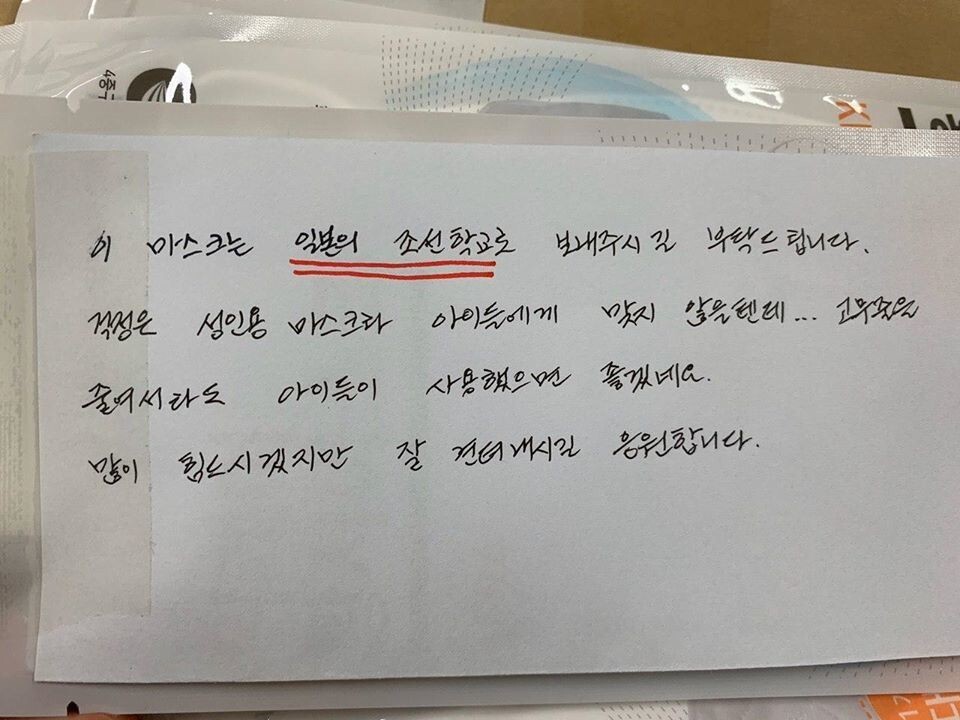hankyoreh
Links to other country sites 다른 나라 사이트 링크
Civic groups donate masks to Chosen Gakko in Japan in response to discriminatory policy

“These handmade masks were made by my mother to share with seniors living on their own. It’s not much, but I hope it will be some small help.”
“They’re masks for adults, so they may not fit children. [. . . ] I hope the children can use them, even if they have to tighten them with rubber bands.”
In response to news that the city of Saitama in Japan’s Saitama Prefecture had excluded a Chosen Gakko (Korean school) from publicly distributed masks for novel coronavirus prevention, an increasing number of people have been donating masks and funds to South Korean civic groups to send to the schools. Saitama has since withdrawn its discriminatory measure in response to an intense outcry in Japan and abroad.
On Mar. 19, 10 civic groups, including the Korean Council for Justice and Remembrance for the Issues of Military Sexual Slavery by Japan and Mongdang Pencil, announced that “over 1,500 masks and 24 million won [US$19,224] in funds were raised [as of 11 am that day] following a campaign for masks and mask-purchasing funds for the Korean school in Saitama.”
On Mar. 13, the Korean Council and other groups criticized the “severely discriminatory policies by the Japanese central and local governments against Korean schools in Japan at a time when the power of solidarity is needed more than ever before, including the city of Saitama’s decision to deny mask distribution to a Korean kindergarten.” At the time, they announced that they were waging “campaigns of letters of protest to the Japanese central and local governments and donations of masks.”
Citizens shared handwritten messages while sending donations of masks, funds, and hand sanitizer to related groups. In one letter, five donors wrote, “We were so angry to hear in the news about the mask discrimination against Korean schools in Japan. [Our donation] is small, but we hope it will be a great source of strength.”
Gil Won-ok, a Japanese military “comfort woman” survivor, provided a donation of 200,000 won (US$160) on Mar. 18 with a message reading, “Our children must stay strong. I am sharing my own small contribution.”
Saitama faced criticism for being discriminatory after it did not provide coronavirus prevention masks to a Korean kindergarten when it began distributing them to daycare centers, kindergartens, and after-school classes under its jurisdiction on Mar. 9. Forty-one students are currently attending the local Korean kindergarten. A Saitama city official also came under fire at the time for implying that the school “might sell the masks to someplace else.” After officials at the kindergarten and others protested, the city apologized and announced that it would be adding the kindergarten to the list of institutions receiving masks.
On Mar. 13, the Korean Council sent a letter of protest to the UN High Commissioner for Human Rights and World Health Organization director-general claiming that the Japanese government’s discriminatory policies violated international human rights principles and demanding that the institutions focus on racially based exclusion and discrimination in Japanese mask distribution policies so that the problem could be resolved.
“This sort of anti-humanitarian racial discrimination is an immature act for a local government to be engaging in,” said Han Kyung-hee, the Korean Council’s secretary-general.
“While the group has sent support for masks, there have been more cases of individuals sending three or four as their own contributions,” she added.
“I think this will be a big source of strength for the children at Korean schools, who are facing difficult conditions,” she said.
By Kang Jae-gu and Kim Min-je, staff reporters
Please direct comments or questions to [english@hani.co.kr]

Editorial・opinion
![[Column] Season 2 of special prosecutor probe may be coming to Korea soon [Column] Season 2 of special prosecutor probe may be coming to Korea soon](https://flexible.img.hani.co.kr/flexible/normal/500/300/imgdb/original/2024/0426/3317141030699447.jpg) [Column] Season 2 of special prosecutor probe may be coming to Korea soon
[Column] Season 2 of special prosecutor probe may be coming to Korea soon![[Column] Park Geun-hye déjà vu in Yoon Suk-yeol [Column] Park Geun-hye déjà vu in Yoon Suk-yeol](https://flexible.img.hani.co.kr/flexible/normal/500/300/imgdb/original/2024/0424/651713945113788.jpg) [Column] Park Geun-hye déjà vu in Yoon Suk-yeol
[Column] Park Geun-hye déjà vu in Yoon Suk-yeol- [Editorial] New weight of N. Korea’s nuclear threats makes dialogue all the more urgent
- [Guest essay] The real reason Korea’s new right wants to dub Rhee a founding father
- [Column] ‘Choson’: Is it time we start referring to N. Korea in its own terms?
- [Editorial] Japan’s rewriting of history with Korea has gone too far
- [Column] The president’s questionable capacity for dialogue
- [Column] Are chaebol firms just pizza pies for families to divvy up as they please?
- [Column] Has Korea, too, crossed the Rubicon on China?
- [Correspondent’s column] In Japan’s alliance with US, echoes of its past alliances with UK
Most viewed articles
- 1‘We must say no’: Seoul defense chief on Korean, USFK involvement in hypothetical Taiwan crisis
- 2Is Japan about to snatch control of Line messenger from Korea’s Naver?
- 3Division commander ordered troops to enter raging flood waters before Marine died, survivor says
- 4[Editorial] Korea’s surprise Q1 growth requires objective assessment, not blind fanfare
- 5[Column] Season 2 of special prosecutor probe may be coming to Korea soon
- 6[Special report- Part III] Curses, verbal abuse, and impossible quotas
- 7Flying “new right” flag, Korea’s Yoon Suk-yeol charges toward ideological rule
- 8[Guest essay] The real reason Korea’s new right wants to dub Rhee a founding father
- 9[Column] ‘Choson’: Is it time we start referring to N. Korea in its own terms?
- 10[Column] Park Geun-hye déjà vu in Yoon Suk-yeol